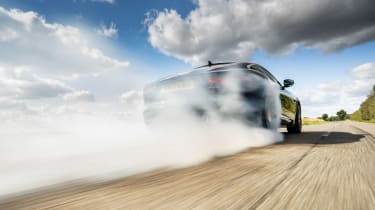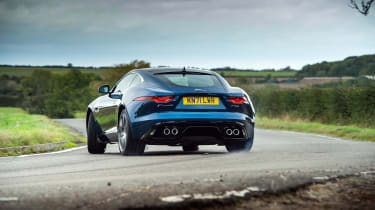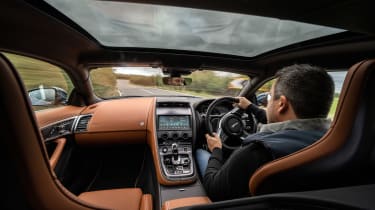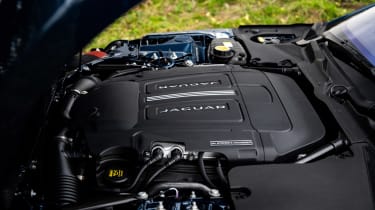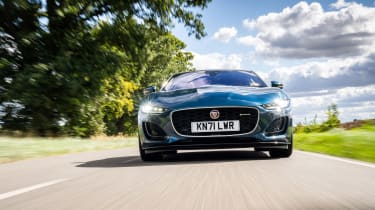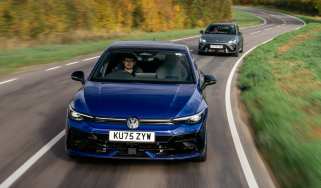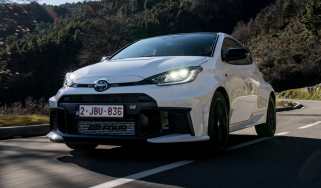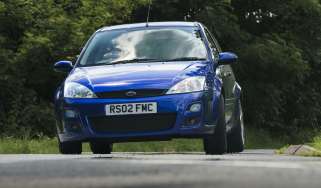Jaguar F-type P450 RWD – long term test
A brilliant old-school British GT that gave us 12 months of fabulous V8-powered fun
It’s almost 20 months since I first sat down at my laptop to explore Jaguar’s configurator and spec the F-type that would become KN71 LWR. Now, a little over 12 months after I was first handed its key, my time with the fastback Jag is up.
Having loved every mile of a drive to Switzerland and back in the summer, I’d hoped to give it a decent send-off with one last road trip, but work commitments conspired against that plan. Not that this has got in the way of me enjoying my last few weeks with the F-type, for it’s one of those cars that makes even the shortest journey feel a little bit special.
The great thing about running a long-termer is you don’t have to maintain steely road-tester impartiality. And, if you’re fortunate to have the chance to pick a car you’re keen to get to know, and have the opportunity to spec it right down to the colour of its wheel centres, then you really do feel emotionally invested.
Truth be told I didn’t hold back with the options. In all, my spree lifted the P450 RWD R-Dynamic’s price to a little over £86k, up from £68k for a standard car. Petrolix Blue was a colour selected from the SVO options list at a cost of £4500, but it looked a million dollars. The glass roof (£1335) was another extravagance but was a real source of pleasure as it brought the interior to life. Pixel LED lights were another £1225 but proved brilliant on rural roads, where the adaptive matrix main beam maximised visibility without dazzling oncoming drivers. The Tan Windsor extended leather interior and Performance seats added a further £2800 and looked magnificent. Comfort was first-rate and the quality put cars costing many times more to shame. It made for a car that looked fabulous and drove brilliantly.
More reviews
In-depth reviews
- Jaguar F-Type (2020 - 2024) facelift review – flying the flag for the great British sports car
- Jaguar F-type (2013 - 2019) review – stunning looks and still able to thrill on the road
Reviews
- Jaguar Project 7 (2015 - 2016) review – the peak of Jaguar's outgoing era?
- Used Jaguar F-Type (2013 - 2024) review and buyer’s guide
- Lister Thunder review – is 666bhp too much?
- Jaguar F-type 400 Sport review - sharper V6 nibbles at F-type R's heels
- 2017 Jaguar F-type SVR review – small tweaks to the top-of-the-range F-type
- Jaguar F-Type SVR Convertible review - a 567bhp assault on the senses
I was surprised at how up for it the F-type was when you really stretched it. Jags tend to be a bit of a handful when pushed to extremes, but the R-Dynamic F-type had a precision that always made it predictable and exploitable, even in wet conditions. The brakes – bigger in R-Dynamic spec – could be a little sharp on your initial input, but there was plenty of power and enough feel to drive with finesse.
Ride-wise I tended not to stiffen the suspension in Dynamic mode unless the surface was particularly smooth. On typical country roads it dealt with lumps and bumps better in its more pliant settings. However, I did enjoy the added sharpness and response provided by the sportier powertrain and steering modes; these just injected a nice amount of energy into the F-type’s responses without making it too aggressive.
Similarly I pretty much always ran the car with the exhaust in its more vocal mode. This wouldn’t have been the case with an earlier F-type, but this late-phase car was never raucous, instead emitting a rich burble at idle and a modestly meaty rumble at middling throttle openings. Only when you really opened the taps did it sound properly snorty, and even then it was never offensive or gratuitous.
Apart from a couple of scuffs on the left-rear and right-front wheels (please don’t ask – it took me weeks to recover from the trauma) there was very little in the way of wear and tear to indicate the car had covered more than 12,000 miles. The driver’s seat bolster resisted scuffs and creases from repeated ingress and egress, while the (unprotected) paintwork seemed resistant to all but the faintest road rash. Some of the chrome surround for the side windows started to come slightly adrift, but that’s the closest there was to any kind of fault.
Mechanically it left in rude health, having received a first service by Jaguar immediately prior to its collection from Meaden Towers. The sweet-revving and sonorous 444bhp supercharged V8 sipped oil during my tenure, requiring just one small glug of lubricant in the time I had it. As for petrol, it tended to do around 23mpg, but would top 30mpg on a motorway run. Pretty good for a 5-litre V8! Despite my best efforts, even the tyres remained in good shape.
Opting for the softer state of tune might seem contrary to the Motoring Journalists’ Code of Conduct, but I never even considered going for the full headbanger-spec 576bhp all-wheel-drive range-topper. Partly because I didn’t relish the fuel overheads, but mostly because the more subtle P450 RWD seemed like the sweet spot of the F-type range.
Perfectly matched to the rear-wheel-drive chassis, the lower-tune V8 was always a highlight, whether wafting quietly along at low revs or enjoying the upper reaches of its range. Early F-types tended to be too loud and brash – understandable given Jaguar hadn’t had much to shout about for so long – but as it has matured, the F-type became a consummate sports car. Classy and confidently understated, it never went unnoticed, with most journeys resulting in a few admiring glances or ‘Nice car, mate’ comments.
All of which left me rather bemused at the predicament Jaguar currently finds itself in. Internal politics notwithstanding, I’ve never understood why a car as good as the F-type can have been so overlooked. It might not hit the dynamic heights of a Cayman GTS, but it’s not that far off. With charisma in spades, the kudos of a supercharged V8 and the novelty of not being a Porsche, it’s a hugely desirable car. Jaguar deserves so much more.
I’ve run enough long-termers to know life won’t quite be the same without the Jag. It hurts that little bit more because having ordered it to my exact specification it really felt like my car. As John Barker concisely summed up having borrowed it for a week or so, the P450 is ‘quietly epic’. To whomever ends up buying KN71 LWR, I hope you love it as much as I have. It’s a wonderful car.
End-of-term figures:
| Date acquired | October 2021 |
| Duration of test | 12 months |
| Total test mileage | 11,525 |
| Total costs | £494 (service) |
| Overall mpg | 24.1 |
| Price new | £86,573 |
| Value today | £66,400 |
This end-of-term Fast Fleet report was first published in evo 305. To catch up with the whole long-term fleet, grab the current issue in-store or online at evo-shop.co.uk
